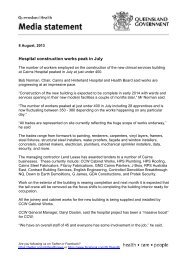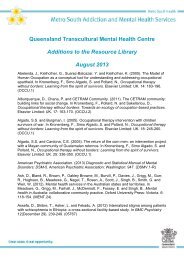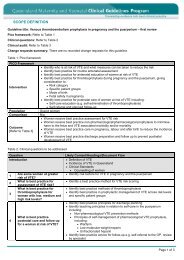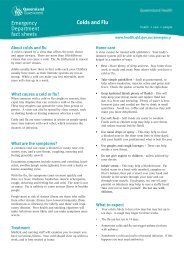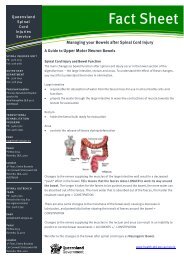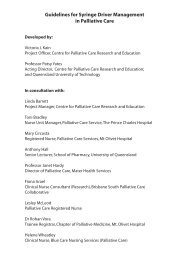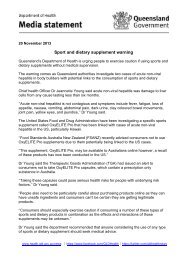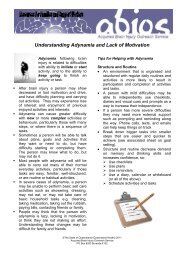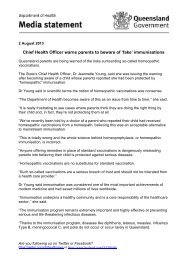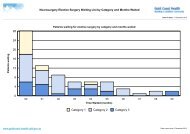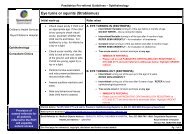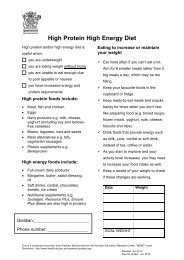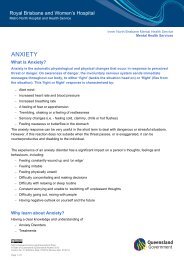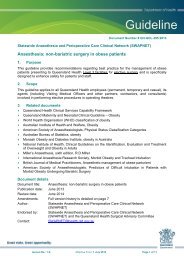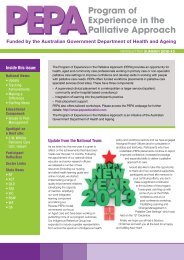Paediatrics - Queensland Health - Queensland Government
Paediatrics - Queensland Health - Queensland Government
Paediatrics - Queensland Health - Queensland Government
Create successful ePaper yourself
Turn your PDF publications into a flip-book with our unique Google optimized e-Paper software.
Gastrointestinal problems<br />
Nutrition during gastroenteritis<br />
• Poor appetite is normal during the acute phase of the illness - during this time, ensure<br />
fluid intake is sufficient as described above<br />
• Babies and young children who are breastfeeding will want to feed more often when<br />
they are sick - this is normal. Support mum to breastfeed more frequently<br />
• Acute gastroenteritis can result in transient lactose intolerance. Formula fed babies<br />
may need lactose free formulas until the baby’s gut recovers sufficiently to digest<br />
and absorb lactose<br />
• It is particularly important to ensure that formula fed babies get sufficient fluids<br />
• Breastfeeding should be maintained during the acute phase and through any<br />
subsequent lactose intolerance. Breastfed babies are fed more frequently than<br />
formula fed babies and are usually able to tolerate the lactose in the breast milk<br />
• If the child has an appetite, eating should be encouraged but avoid fatty food or high<br />
sugar foods and drinks<br />
Nutrition after gastroenteritis<br />
• Encourage continued breastfeeding with healthy food as well if the child is six months<br />
or older<br />
• If the child is under one year of age and not breastfed, he / she will need infant<br />
formula, not cows milk. The type of formula will depend on whether the child can<br />
tolerate lactose<br />
• An episode of acute gastroenteritis may result in weight loss<br />
• For children > 6 months of age, once the child’s appetite returns, encourage carer to<br />
provide healthy food with one extra meal each day until lost weight is regained<br />
• <strong>Health</strong>y food is important for replacing lean body tissue lost during the illness -<br />
encourage lean meat, fish, eggs, fruit and vegetables, peanut paste, baked beans,<br />
cheese and yoghurt, and wholegrain cereals like Weet-Bix ®<br />
• Children over one year of age can have cows milk provided there is no lactose<br />
intolerance<br />
• Monitor weekly to ensure healthy growth is resumed<br />
• Refer to MO if healthy growth is not resumed within four weeks - repeated or chronic<br />
infections can result in poor appetite and growth failure<br />
6. Referral / consultation<br />
Consult MO immediately as above<br />
Children with chronic diarrhoea. See Child with chronic diarrhoea flow chart<br />
Children with weight loss or poor weight gain who are not acutely unwell - refer to<br />
Child <strong>Health</strong> Nurse or next MO clinic<br />
See Poor growth in children in the latest edition of the Chronic Disease Guidelines<br />
www.health.qld.gov.au/cdg/default.asp<br />
Primary Clinical Care Manual 2011 Controlled copy V 1.0 609



